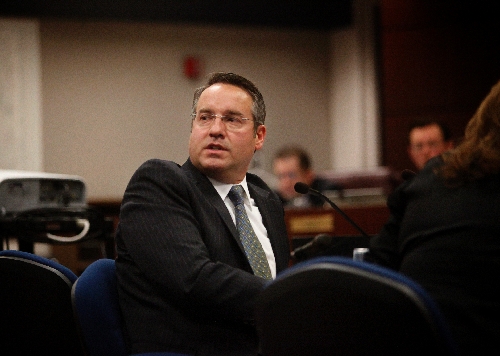Board may cut 18 gaming regulators

Nevada gambling regulators would cut $4.2 million in spending and eliminate 18 jobs by 2013 despite concerns by some that the state’s regulatory capability is falling behind other jurisdictions, a gaming control official told legislators Tuesday.
If Gov. Brian Sandoval’s proposed budget is approved by the Legislature, the number of gaming regulators in Nevada would fall to about 418, close to the number employed in 1997 when gambling tax collections were 31 percent lower, The Mirage was the biggest resort on the Strip and many slot machines didn’t accept paper money.
According to a presentation to the Senate Finance Committee by Gaming Control Board Chairman Mark Lipparelli, control board employment peaked at 462 people in 2008 and declined to 437 this year, despite an increase in bankruptcies that sparked a sudden demand for auditors who are being pulled from working on cyclical audits.
"We have to scramble a team, do a closing audit, then get back to our task of getting people on our regular audit. There is no way to adjust for that," Lipparelli said of demand increases caused when a regulated gambling company fails. "I wish I could say those times are behind us, but I do believe there will be more to come."
The control board collected about $829 million in tax revenue from gambling, the cornerstone of Nevada’s hospitality industry. Part of the success of the business is the perception that games are tightly regulated.
"It is really one of the important things," David Schwartz, director of the Center for Gaming Research at the University of Nevada, Las Vegas, said of gaming regulation. "And since the industry is so important to the state, (regulation) is vitally important to the state."
Under the Sandoval budget proposal, true spending would be about $84.4 million for the 2011-13 biennium, a decrease of about 4.7 percent from the previous two years.
About $2.7 million of the savings would come from eliminating 18 positions, including four auditors, four regulatory agents, two from the gaming lab and one investigator.
The proposed budget also would leave little to no money to prepare Nevada’s regulatory structure for the potential legalization of Internet gambling.
"I’m a little concerned with some of the cuts we are enacting," said Sen. Sheila Leslie, D-Reno, vice chairwoman of the committee. "It sounds like we are not keeping pace with the industry and we really need to be."
About 60 percent of the control board’s funding comes from the state’s general fund, which Sandoval has pledged to cap at about $5.8 billion for 2011-13. The remainder comes from charges to companies for things such as investigations, employee registration and gaming lab fees.
The industry’s contribution to regulation is expected to be about $2.9 million higher for 2011-13 than it was in the previous two years in large part because the board increased the hourly rate for investigations from $80 to $135 at the urging of the Legislature in 2010.
Committee members on Tuesday talked about other ideas to push regulation costs onto the industry, but they didn’t reach any conclusions.
Lipparelli presented a document created at the behest of the Legislature’s Interim Finance Committee that showed different ways fees could be imposed on slot machines to make the regulators 100 percent industry supported.
But those changes are opposed by gaming companies and by Sandoval, who has promised not to impose new taxes or fees to balance the budget.
Also, Lipparelli said gaming companies are already bristling at the increased hourly rate for investigations.
The increased cost also dissuades smaller operators and entrepreneurs from entering the market, Lipparelli said.
"The fee to get in the business has now gone substantially greater than what would be the norm," he said.
However, Leslie said she thinks the industry could pay more of the freight for regulation.
"I think asking the industry to foot more of the bill in these difficult times is appropriate," she said. "We need to keep our regulatory system for gaming fully funded one way or another."
Contact reporter Benjamin Spillman at bspillman@reviewjournal.com or 702-477-3861.